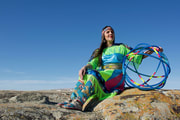|
Last week Canada Arts Connect (http://canadaartsconnect.com/) asked the question: Should artists/ musicians/ actors/ writers be role models?
The answer to this question may depend on a lot of factors such as culture, medium, purpose/intention and audience. I want to tackle this issue using one aspect of good role modelling- being drug and alcohol free. I will also be 'lumping' all artists together - dancers, musicians, actors, visual artists - Carelessly, yet gladly! For I believe artists SHOULD work together more as a cohesive lump :) From my own life experiences (fifteen years experience n ten international styles of dance) I know that being drug and alcohol free can be one of the major differences between Western and Native art forms. In Western art forms, especially in mainstream and popular cultures, it may be the opposite with the most ‘successful’ artists being those who many parents dread their children become fans of (myself included). But, is that the purpose of art? Financial gain and popularity? Surely, there are more efficient ways of achieving this. For many Native artists cultural values such as respect, equality and responsibility (hence, role modelling) are part of their practice. This has been the case for myself as a hoop dancer. When I first began to learn the hoop dance from my teacher, Jerry First Charger (Kainai), one of the first things he taught me was that once I start dancing people will start to notice. He was saying that I would become a role model. My mother and older sister later told me that when you are doing Native dance you should be drug and alcohol free... again, they were saying that Native dancers are role models. Responsibility is actually a key teaching in the hoop dance and is represented by the hoop itself- whatever you put out comes back to you. Today, I have been four and a half years drug and alcohol free, even though, I started hoop dancing seven years ago... What can I say it was a work in progress! At least I tried, never gave up and was, eventually, successful! ... So basically all I did so far is stereotype artists into non-Native alcoholics and drug addicts V. romanticized Native warriors. Fortunately the world of art is not as black and white as this, or maybe red and white? What about Native people who use contemporary art forms? OR Native people who practice traditional art forms yet continue to abuse drugs and alcohol? OR Non-Native sober artists who practice Native art forms? (Okay, maybe I was getting carried away with that last one)... Just because a Native artists uses contemporary art forms does not mean they use drugs and alcohol... and just because a Native artist uses traditional art forms does not mean they are sober... Although a Native artist may not be sober it does not mean that they do not respect, honor and embody their culture. They may simply choose to express their identity and culture in different ways, highlighting different values and teachings. In the end, as Native artists we walk a fine line between traditional and contemporary... Although I am drug and alcohol free I regrettably do not live in a tipi (except for during Driftpile Powwow!) I drive a car and I go grocery shopping, we've heard this one before. The beauty of being an artist is the ability to create... This is what art is regardless of culture, medium, purpose/intention and audience... It is creating beautiful/ ugly, funny/ boring, vibrant/ dull... yet ALWAYS (or mostly... or hopefully?) creating new and evolving ideas. Whatever stage we are at in our own growth and process as Native artists we can say that we are creating something new (new interpretations, forms, techniques, designs, patterns...). This new 'thing' is often the result of the ongoing negotiation between the traditional and contemporary. Artists themselves are part of this ongoing negotiation so it is reflected in our everyday life. We make our own choice of where we draw the line between the traditional and contemporary. Or even how we define traditional and contemporary (that's a whole new blog). So, should artists be role models? I think we are all role models and there is always someone watching us... But the definition of what a role model is may be totally up to the individual.
2 Comments
7/26/2019 01:22:24 am
I work in the music industry, which is why I have a lot to say about this topic. If you ask me, it is important that we do not take them for granted, them being the musicians of course. Well, they are amazing people, but they are not superior beings. While they are talented people, they are not that perfect. We should think of how we react to their work, because we can also affect what they do in their life.
Reply
Leave a Reply. |
Nehiawsko Pikiskwew'Cree Woman Speaking' is a space to share my voice. My goal is to spread awareness and share wisdom as I learn and grow as a dancer, choreographer, and woman. My passion is to show the healing power of dance and culture. I love learning from elders, experience, and research and being able to synthesize Native and non-Native ways of knowing! Archives
November 2023
Categories
All
|
